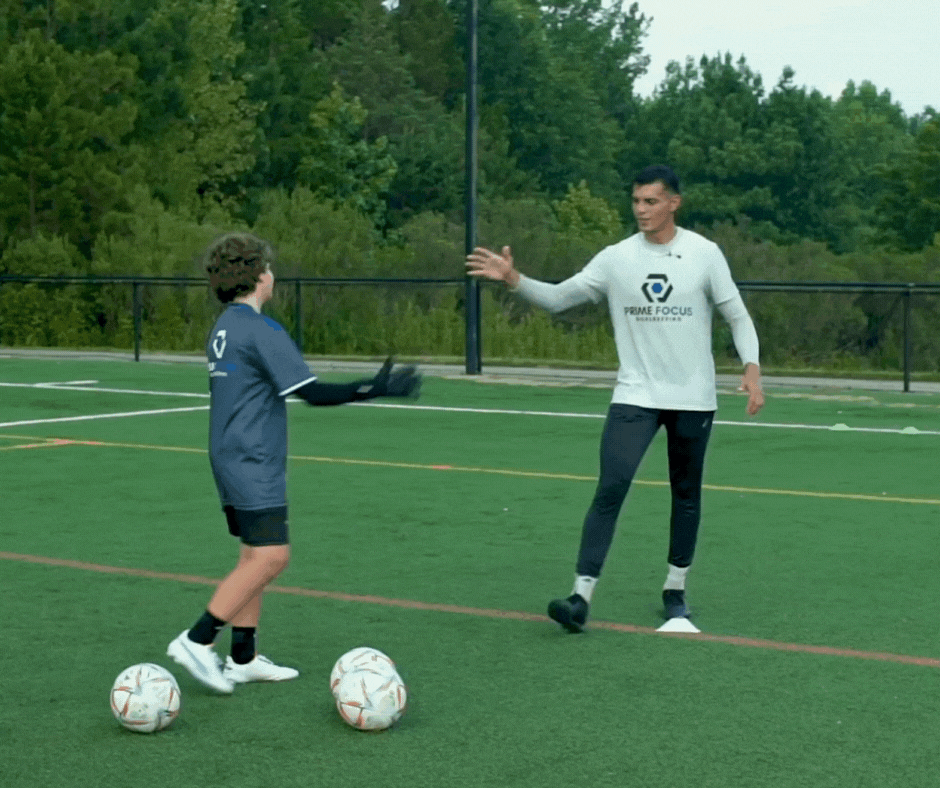Command Your Box: Mastering Communication for Young Goalkeepers
- Brandon Miller
- Sep 10, 2024
- 5 min read
In the dynamic world of soccer, the role of a goalkeeper transcends beyond merely stopping goals. It involves orchestrating the defense, making split-second decisions, and most crucially, effective communication. For young goalkeepers aspiring to leave a mark on the pitch, mastering the art of communication is as vital as honing their reflexes. In this blog post, we offer an in-depth exploration of strategies and tips to empower upcoming goalkeeping talents with the skills to lead from the back.
A young goalkeeper might dream of gravity-defying saves and acrobatic leaps, but the truth is, communication is their most potent weapon. Unlike any other player on the field, the goalkeeper has a commanding view of the entire game. This makes them the defensive leader, responsible for marshalling their teammates and directing the flow of the game in the backfield. Check out this amazing book that can help you develop some of the best effective communication techniques.
Imagine a chaotic scramble in the box. Without clear communication, defenders might hesitate, unsure of who's marking whom. A well-timed shout from the goalkeeper, calling out positions and directing challenges, can turn that scramble into a controlled clearance. Communication builds a unified defensive unit, where each player anticipates danger and reacts cohesively. It's the difference between a frantic scramble and a composed defensive display.
This is a crucial aspect of goalkeeper communication, as it sets the tone for how a goalkeeper controls their area and commands respect from teammates and opponents. A strong presence helps instill confidence in the defense, allowing defenders to trust the goalkeeper's decisions and positioning. This is achieved through clear, assertive communication that directs the backline, ensures proper marking, and provides a sense of organization and leadership.
Effective communication is the backbone of establishing presence, enabling goalkeepers to assert authority over their 18-yard box. By consistently issuing clear, confident instructions, goalkeepers can prevent defensive lapses and keep their team well-organized. This leadership not only reduces the likelihood of conceding goals but also helps maintain team morale and cohesion, as players feel secure knowing their goalkeeper is in control.
Being commanding is essential for goalkeepers to effectively lead and organize their team. A goalkeeper with a strong, clear set of commands can quickly convey crucial information to teammates, ensuring everyone is on the same page during key moments in the game. It is essential to have consistent, efficient phrases that convey the information you want to get across quickly without overloading your teammates with too much information. No one wants to hear a word scramble while dealing with runners on the field!
By consistently using a well-defined set of commands, goalkeepers can eliminate confusion and hesitation in the backline, leading to quicker reactions and better overall team defense. A commanding vocabulary also reinforces the goalkeeper's authority, helping to establish their role as the defensive leader. Over time, teammates learn to trust and respond instinctively to the goalkeeper's instructions, fostering a sense of unity and discipline that is crucial for maintaining a strong defensive performance.
This comes with experience but is a crucial skill for goalkeepers, enabling them to anticipate and react to plays before they fully develop. A goalkeeper who can read the game effectively understands the flow of play, recognizes patterns, and predicts the opponent's next moves. This foresight allows them to position themselves optimally, intercept passes, and make timely saves. Don't get this confused with the poor habit of leaning on strikes; that isn't the type of anticipation we want!
By honing this skill, goalkeepers can stay one step ahead, reducing the pressure on their defense and preventing dangerous situations. Reading the game also enhances decision-making, helping goalkeepers determine when to stay on their line, come out to challenge an attacker, or organize their defense. This ability to read and react is what sets top goalkeepers apart, making them a vital asset to their team.
Building strong relationships with defenders is essential for any goalkeeper looking to command their box effectively. Communication between the goalkeeper and the defense is the bedrock of a well-organized backline. When goalkeepers foster trust and understanding with their defenders, it leads to better coordination during defensive plays and set pieces. This relationship is cultivated through consistent, clear, and respectful communication during training and matches. Goalkeepers who actively engage with their defenders by giving specific instructions, offering encouragement, and providing feedback can help create a more cohesive unit that anticipates each other’s movements and reacts quickly to threats.
Effective communication not only improves defensive solidity but also boosts a goalkeeper's confidence and influence on the pitch. When goalkeepers are vocal and assertive, they can direct their defenders to cover key areas, manage opposing attackers, and ensure that everyone is aligned in their defensive responsibilities. This proactive approach reduces the likelihood of defensive lapses and helps in maintaining a structured defensive shape. By mastering the art of communication, young goalkeepers can enhance their leadership skills and foster a sense of unity and reliability within the team, ultimately leading to better overall defensive performance and a stronger command of their box.
These are pivotal in developing a goalkeeper’s ability to communicate effectively. Goalkeeping is a dynamic position where there is always room for growth and refinement. Regular feedback from coaches, peers, and self-assessment helps goalkeepers identify areas for improvement and fine-tune their communication skills. Embracing a mindset of continuous learning allows goalkeepers to adapt their strategies and techniques based on both successes and mistakes, which is crucial for managing high-pressure situations and evolving with the game.
Integrating feedback into training sessions and match performances promotes a culture of excellence and self-awareness. When goalkeepers actively seek and apply constructive criticism, they enhance their ability to communicate clearly and assertively with their defenders. This ongoing process of improvement not only helps in refining their command of the box but also builds resilience and confidence. By continually striving to improve and being open to feedback, young goalkeepers can develop a stronger presence on the field, ensuring they are well-prepared to handle the demands of the position and lead their team effectively.
Mastering communication is a journey that demands dedication, practice, and a deep understanding of the game. Young goalkeepers who commit to developing their communication skills will find themselves not just as shot-stoppers, but as leaders who can truly command their box. As the backbone of the team's defense, your voice can turn the tide of the game, making it imperative to communicate effectively, decisively, and with authority. The path to becoming a distinguished goalkeeper is complex, but with the right focus on communication, the journey can be remarkably rewarding.
Head over to our Amazon Storefront to see all of our BEST goalkeeping recommendations for both on and off the field. You can also head over to our online shop to see our entire line of goalkeeper gloves, apparel, and FREE resources. Be sure to follow us on all of our social media pages: Facebook, Twitter, TikTok, Instagram, Pinterest, and YouTube.

























Comments